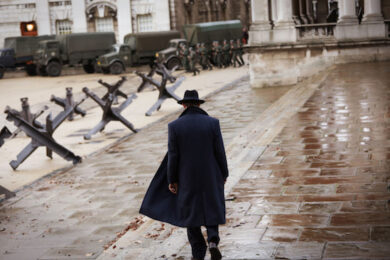SS-GB is an alternate history drama, that posits a German win in the Battle of Britain and subsequent British surrender, adapted by screenwriting duo Neal Purvis and Robert Wade from Len Deighton’s novel of the same name. Purvis and Wade wrote the superb film Let Him Have It in the early 90s, a dramatisation of the trial and hanging of the mentally underdeveloped teenager Derek Bentley. However, they also wrote the last five James Bond movies, and it’s the whizz-bang-pow of Bond we see here, when the material could have really used some of Let Him Have It‘s nuance and historical precision.
SS-GB‘s conceit is to speculate what London under Nazi control would look like. And the answer is, seemingly, an impeccably stylish, strangely un-bombed place, where all the British men over 35 look like Lord Kitchener, all under 35 like members of Suede in the mid-90s, and a steady supply of femmes fatale twirl to big-band jazz, whispering geo-political secrets into the ears of any willing dance partners. Wartime austerity is mentioned, but rarely seen, and the gentlemen’s tailoring is to die for.
The occupying Nazi forces’ main shtick seems to be that they’re rather brusque, and tedious sticklers for detail, but otherwise fairly reasonable chaps. On the whole, occupation is treated as a conceptually disagreeable matter of sovereignty, rather than anything especially harsh. It’s a weirdly mannered, Brexit-flavoured vision of the matter, upset about all the sauerkraut, but with little to say about (to give just one striking omission) the Jewish population of London in 1940.
The plot centres around Detective Superintendent Douglas Archer of Scotland Yard, played by Sam Riley as a somewhat implausible mix of indie heart-throb and Twin Peaks’ Agent Cooper, wandering around London in a long overcoat and a rakish hat. Seemingly, the way to gain the Alt-Reality Nazis’ trust is simply to Look Very Cool While Lighting a Cigarette, and Riley certainly does that. To be fair to him, he gives a commanding performance throughout, but the character he’s been given makes almost no sense.
Douglas is pulled in multiple directions at once. There are competing politics within the Nazi occupation itself, and as a senior British police officer, Douglas lives with the stigma and risk of being thought a collaborator, despite holding the sincere view that the police are "non-political and always will be".
At the same time, he is also trying not to get drawn into what the programme coyly calls ‘The Resistance’, which is the element which most raised my hackles.
I confess I’ve not read the novel, so it’s not for me to say how much of this is to be laid at Deighton’s door. Certainly, Deighton knows his WWII history, and has written a number of well-regarded non-fiction works on the subject. As such, he would know that what is called ‘The Resistance’ here is clearly modelled on the secret GHQ Auxiliary Units, set up by Colonel Colin Gubbins under orders from Churchill in 1940.
The Auxiliary Units comprised around 3,500 servicemen, mostly drawn from the Home Guard, and operating in individual cells of less than ten men. They were to be activated in the event of a German invasion of the British mainland.
The Auxiliary Units were to be supported by an intelligence-gathering network of about 4,000 civilian volunteers, and these are also represented in the programme in the form of Douglas’s secretary and love interest Sylvia.
It’s worth a pause to consider the sheer bravery expected of these people. They were, in the event of a formal British surrender, to form a guerrilla resistance, with extremely limited access to resources. In order to protect the overall network, the uniformed servicemen were expected to shoot themselves rather than be captured, and the official estimate was that they would survive for an average of 12 days after occupation began. Meanwhile, the civilians were expected to risk getting as close as possible to the occupying forces, taking a higher risk of detection and capture than even the soldiery.
In the show so far (two episodes of five have aired), the only two truly appalling acts we’ve seen – an attempt to kidnap Douglas’s son, and the murder of one of his junior officers as a warning – are both ‘Resistance’ actions, while the occupiers are mainly just a bit rude. For me, this comes something close to a slander, given the huge amount we do know about the behaviour of the occupiers and the occupied in countries that did fall to the Reich’s advance.
Of course, this is a work of speculative fiction, and Deighton is a writer of snappy spy thrillers, and this is ultimately just a glossy Sunday night BBC period drama, and I should probably just get over it. Also, it seems likely that when the novel was published in 1978, this didn’t seem quite so crass as it does now, and in fairness, it has taken a long time for knowledge of the Auxiliary Units to become fully public. But it rings an odd note in the show, where what would have been the only remaining active British resistance to fascism come across as crackpot ideologues, while the Nazis are seemingly just doing their jobs.
It’s not clear where all this is headed, but so far, this is a madman’s breakfast of a programme, that takes itself far too seriously, while managing to not take its subject matter seriously at all. But the uniforms do look fabulous.



